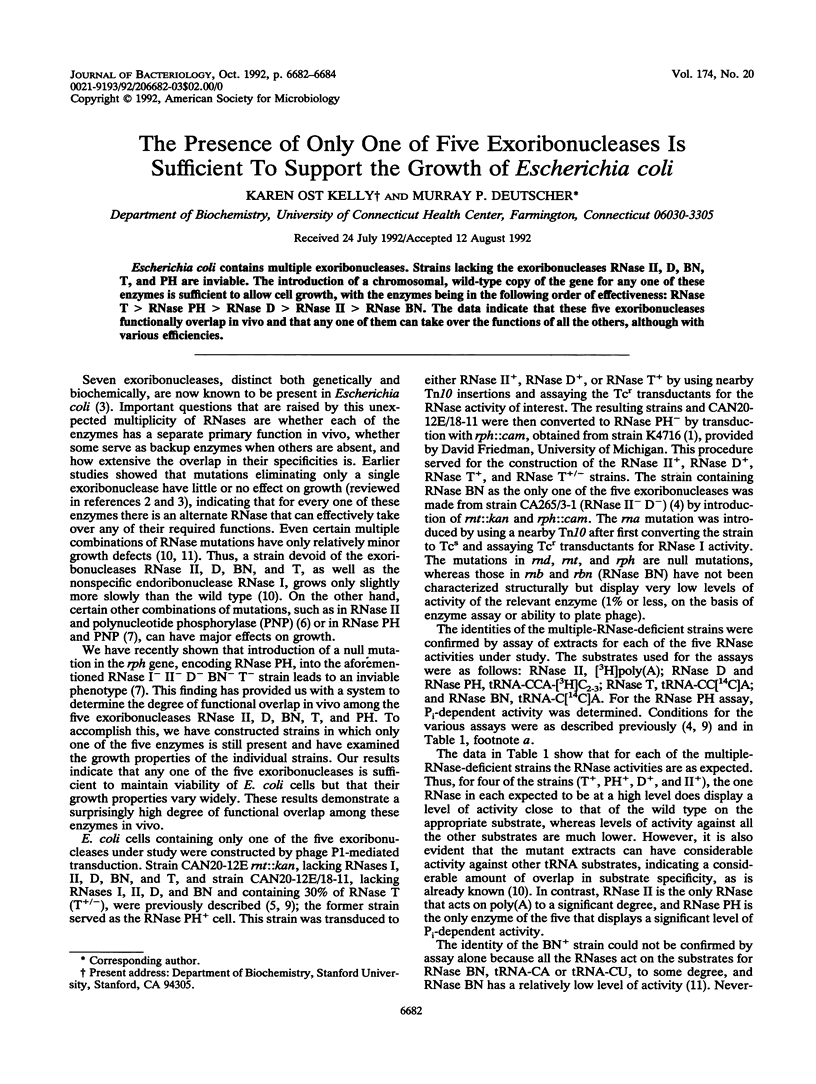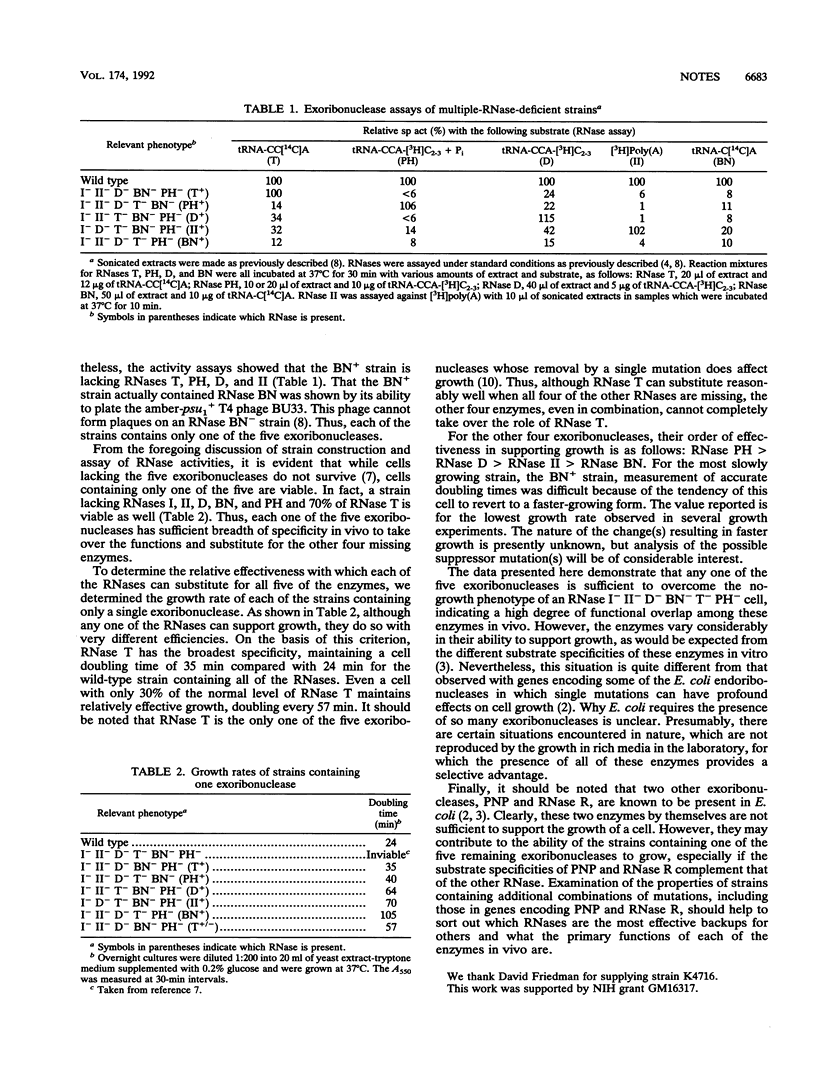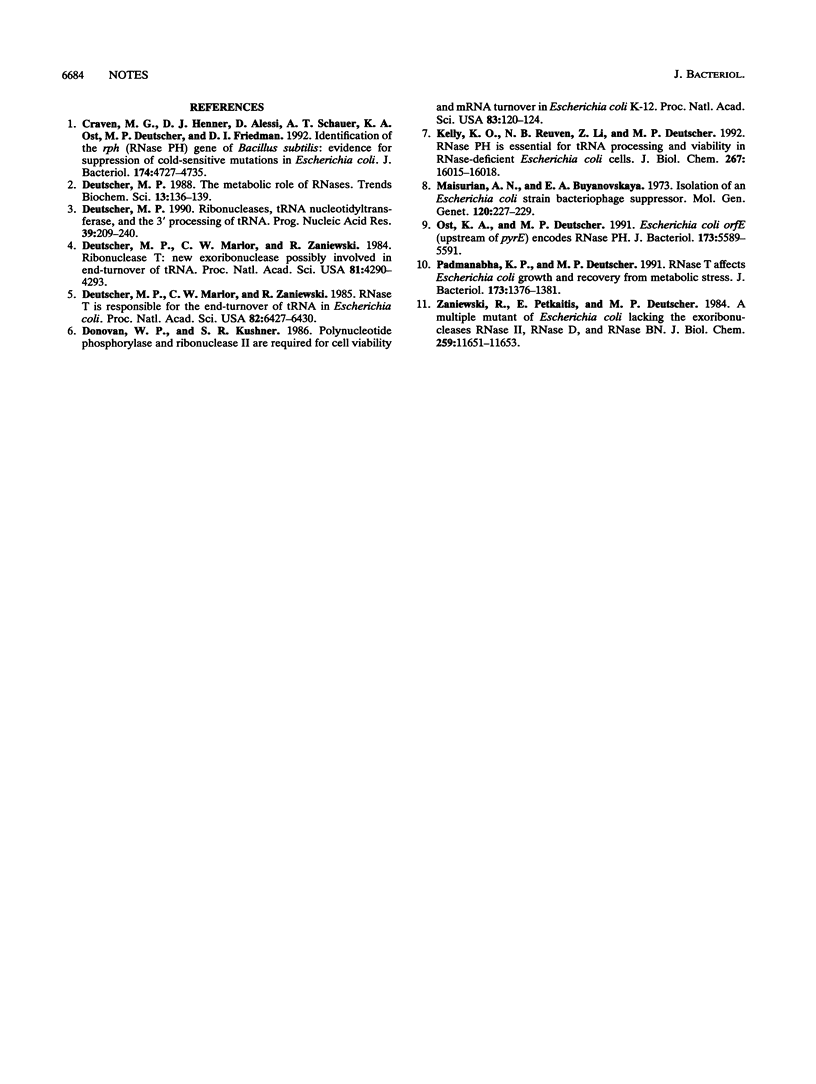Abstract
Escherichia coli contains multiple exoribonucleases. Strains lacking the exoribonucleases RNase II, D, BN, T, and PH are inviable. The introduction of a chromosomal, wild-type copy of the gene for any one of these enzymes is sufficient to allow cell growth, with the enzymes being in the following order of effectiveness: RNase T > RNase PH > RNase D > RNase II > RNase BN. The data indicate that these five exoribonucleases functionally overlap in vivo and that any one of them can take over the functions of all the others, although with various efficiencies.
Full text
PDF


Selected References
These references are in PubMed. This may not be the complete list of references from this article.
- Craven M. G., Henner D. J., Alessi D., Schauer A. T., Ost K. A., Deutscher M. P., Friedman D. I. Identification of the rph (RNase PH) gene of Bacillus subtilis: evidence for suppression of cold-sensitive mutations in Escherichia coli. J Bacteriol. 1992 Jul;174(14):4727–4735. doi: 10.1128/jb.174.14.4727-4735.1992. [DOI] [PMC free article] [PubMed] [Google Scholar]
- Deutscher M. P., Marlor C. W., Zaniewski R. RNase T is responsible for the end-turnover of tRNA in Escherichia coli. Proc Natl Acad Sci U S A. 1985 Oct;82(19):6427–6430. doi: 10.1073/pnas.82.19.6427. [DOI] [PMC free article] [PubMed] [Google Scholar]
- Deutscher M. P., Marlor C. W., Zaniewski R. Ribonuclease T: new exoribonuclease possibly involved in end-turnover of tRNA. Proc Natl Acad Sci U S A. 1984 Jul;81(14):4290–4293. doi: 10.1073/pnas.81.14.4290. [DOI] [PMC free article] [PubMed] [Google Scholar]
- Deutscher M. P. Ribonucleases, tRNA nucleotidyltransferase, and the 3' processing of tRNA. Prog Nucleic Acid Res Mol Biol. 1990;39:209–240. doi: 10.1016/s0079-6603(08)60628-5. [DOI] [PubMed] [Google Scholar]
- Deutscher M. P. The metabolic role of RNases. Trends Biochem Sci. 1988 Apr;13(4):136–139. doi: 10.1016/0968-0004(88)90070-9. [DOI] [PubMed] [Google Scholar]
- Donovan W. P., Kushner S. R. Polynucleotide phosphorylase and ribonuclease II are required for cell viability and mRNA turnover in Escherichia coli K-12. Proc Natl Acad Sci U S A. 1986 Jan;83(1):120–124. doi: 10.1073/pnas.83.1.120. [DOI] [PMC free article] [PubMed] [Google Scholar]
- Kelly K. O., Reuven N. B., Li Z., Deutscher M. P. RNase PH is essential for tRNA processing and viability in RNase-deficient Escherichia coli cells. J Biol Chem. 1992 Aug 15;267(23):16015–16018. [PubMed] [Google Scholar]
- Maisurian A. N., Buyanovskaya E. A. Isolation of an Escherichia coli strain restricting bacteriophage suppressor. Mol Gen Genet. 1973 Feb 2;120(3):227–229. doi: 10.1007/BF00267154. [DOI] [PubMed] [Google Scholar]
- Ost K. A., Deutscher M. P. Escherichia coli orfE (upstream of pyrE) encodes RNase PH. J Bacteriol. 1991 Sep;173(17):5589–5591. doi: 10.1128/jb.173.17.5589-5591.1991. [DOI] [PMC free article] [PubMed] [Google Scholar]
- Padmanabha K. P., Deutscher M. P. RNase T affects Escherichia coli growth and recovery from metabolic stress. J Bacteriol. 1991 Feb;173(4):1376–1381. doi: 10.1128/jb.173.4.1376-1381.1991. [DOI] [PMC free article] [PubMed] [Google Scholar]
- Zaniewski R., Petkaitis E., Deutscher M. P. A multiple mutant of Escherichia coli lacking the exoribonucleases RNase II, RNase D, and RNase BN. J Biol Chem. 1984 Oct 10;259(19):11651–11653. [PubMed] [Google Scholar]



